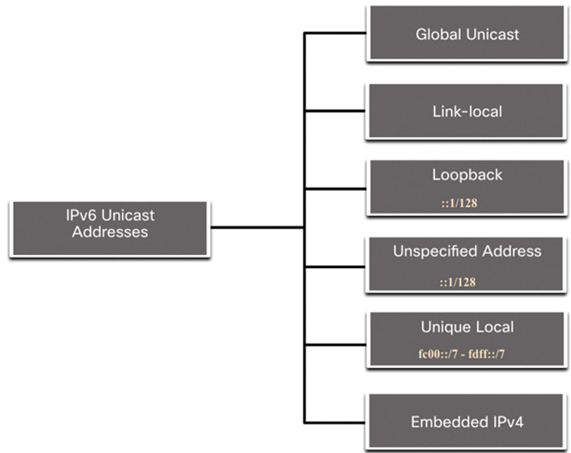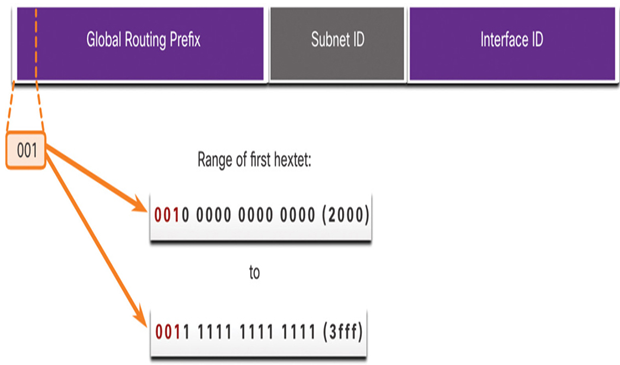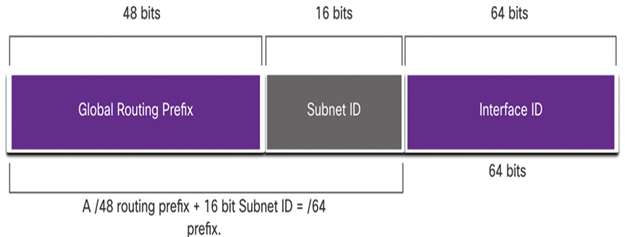Types of IPv6 Unicast Addresses (33.1.3)
An IPv6 unicast address uniquely identifies an interface on an IPv6-enabled device. A packet sent to a unicast address is received by the interface that is assigned that address. Similar to IPv4, a source IPv6 address must be a unicast address. The destination IPv6 address can be either a unicast or a multicast address. Figure 33-2 shows the different types of IPv6 unicast addresses.

Figure 33-2 IPv6 Unicast Addresses
Unlike IPv4 devices that have only a single address, IPv6 addresses typically have two unicast addresses:
- Global unicast address (GUA)—This is similar to a public IPv4 address. GUAs are globally unique, Internet-routable addresses. GUAs can be configured statically or assigned dynamically.
- Link-local address (LLA)—This is required for every IPv6-enabled device. LLAs are used to communicate with other devices on the same local link. With IPv6, the term link refers to a subnet. LLAs are confined to a single link. Their uniqueness must only be confirmed on that link because they are not routable beyond the link. In other words, routers will not forward packets with a link-local source or destination address.
A Note About the Unique Local Address (33.1.4)
Unique local addresses (range fc00::/7 to fdff::/7) are not yet commonly implemented. Therefore, this chapter only covers GUA and LLA configuration. However, unique local addresses may eventually be used to address devices that should not be accessible from the outside, such as internal servers and printers.
The IPv6 unique local addresses have some similarity to RFC 1918 private addresses for IPv4, but there are significant differences: - Unique local addresses are used for local addressing within a site or between a limited number of sites.
- Unique local addresses can be used for devices that will never need to access another network.
- Unique local addresses are not globally routed or translated to a global IPv6 address.
Note
Many sites also use the private nature of RFC 1918 addresses to attempt to secure or hide their network from potential security risks. However, this was never the intended use of these technologies, and the IETF has always recommended that sites take the proper security precautions on their Internet-facing router.
IPv6 GUA (33.1.5)
IPv6 global unicast addresses (GUAs) are globally unique and routable on the IPv6 Internet. These addresses are equivalent to public IPv4 addresses. The Internet Committee for Assigned Names and Numbers (ICANN), the operator for IANA, allocates IPv6 address blocks to the five RIRs. Currently, only GUAs with the first three bits of 001 or 2000::/3 are being assigned, as shown Figure 33-3.

Figure 33-3 Range of First Hextet Values for GUAs
Figure 33-3 shows the range of values for the first hextet where the first hexadecimal digit for currently available GUAs begins with a 2 or a 3. This is only 1/8th of the total available IPv6 address space, excluding only a very small portion for other types of unicast and multicast addresses.
Note
The 2001:db8::/32 address has been reserved for documentation purposes, including use in examples.
Figure 33-4 shows the structure and range of a GUA.

Figure 33-4 IPv6 Address with a /48 Global Routing Prefix and /64 Prefix
A GUA has three parts:
- Global Routing Prefix
- Subnet ID
- Interface ID
